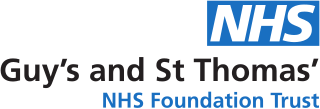Cambridge University Hospitals NHS Foundation Trust is a British public sector healthcare provider located in Cambridge, England. It was established on 4 November 1992 as Addenbrooke's National Health Service Trust, and authorised as an NHS foundation trust under its current name on 1 July 2004.
Independent sector treatment centres (ISTCs) are private-sector owned treatment centres contracted within the English National Health Service to treat NHS patients free at the point of use. They are sometimes referred to as 'surgicentres' or ‘specialist hospitals’. ISTCs are often co-located with NHS hospitals. They perform common elective surgery and diagnostic procedures and tests. Typically they undertake 'bulk' surgery such as hip replacements, cataract operations or MRI scans rather than more complex operations such as neurosurgery.

Queen Elizabeth Hospital is a hospital in Woolwich in the Royal Borough of Greenwich. It was opened in March 2001 and serves patients from the Royal Borough of Greenwich and the London Borough of Bexley. The hospital was built to accommodate the services previously provided at Greenwich District Hospital and Brook General Hospital, and is a Private Finance Initiative hospital. It is managed by the Lewisham and Greenwich NHS Trust.

Emergency medical services in the United Kingdom provide emergency care to people with acute illness or injury and are predominantly provided free at the point of use by the four National Health Services (NHS) of England, Scotland, Wales, and Northern Ireland. Emergency care including ambulance and emergency department treatment is only free to UK residents and a charge may be made to those not entitled to free NHS care.

The National Health Service (NHS) is the publicly funded healthcare system in England, and one of the four National Health Service systems in the United Kingdom. It is the second largest single-payer healthcare system in the world after the Brazilian Sistema Único de Saúde. Primarily funded by the government from general taxation, and overseen by the Department of Health and Social Care, the NHS provides healthcare to all legal English residents and residents from other regions of the UK, with most services free at the point of use for most people. The NHS also conducts research through the National Institute for Health and Care Research (NIHR).

University Hospital Lewisham is a teaching hospital run by Lewisham and Greenwich NHS Trust and serving the London Borough of Lewisham. It is now affiliated with King's College London and forms part of the King's Health Partners academic health science centre. It is situated on Lewisham High Street between Lewisham and Catford.

Guy's and St Thomas' NHS Foundation Trust is an NHS foundation trust of the English National Health Service, one of the prestigious Shelford Group. It runs Guy's Hospital in London Bridge, St Thomas' Hospital in Waterloo, Evelina London Children's Hospital, two specialist heart and lung hospitals, Royal Brompton and Harefield and community services in Lambeth, Southwark and Lewisham.

The Health and Social Care Act 2012 is an act of the Parliament of the United Kingdom. It provided for the most extensive reorganisation of the structure of the National Health Service in England to date. It removed responsibility for the health of citizens from the Secretary of State for Health, which the post had carried since the inception of the NHS in 1948. It abolished primary care trusts (PCTs) and strategic health authorities (SHAs) and transferred between £60 billion and £80 billion of "commissioning", or healthcare funds, from the abolished PCTs to several hundred clinical commissioning groups, partly run by the general practitioners (GPs) in England. A new executive agency of the Department of Health, Public Health England, was established under the act on 1 April 2013.
Circle Health Group is a private healthcare provider in the United Kingdom, and is the country's biggest private hospital provider. The company was founded in 2004 and rebranded as Circle Health Group in 2019 after acquiring a rival, BMI Healthcare; in the same year it began an expansion in China. In 2023 the company was acquired by the Abu Dhabi-based holding company PureHealth.

The National Health Action Party (NHA) is a political party in the United Kingdom.

Clinical commissioning groups (CCGs) were National Health Service (NHS) organisations set up by the Health and Social Care Act 2012 to organise the delivery of NHS services in each of their local areas in England. On 1 July 2022 they were abolished, and replaced by Integrated care systems as a result of the Health and Care Act 2022.

Virgin Care was a private provider of community health and social services in parts of the UK, commissioned by the National Health Service and by local authorities in England. From 2010 the company was known as Virgin Care and was part of Virgin Group. In December 2021, it was acquired by Twenty20 Capital and rebranded as HCRG Care Group.
Oxford University Hospitals NHS Foundation Trust is an English teaching hospital and part of the Shelford Group. It is one of the UK's largest teaching hospitals and one of the largest hospitals in Europe. The trust is made up of four hospitals – the John Radcliffe Hospital, the Churchill Hospital and the Nuffield Orthopaedic Centre, all located in Oxford, and the Horton General Hospital in Banbury, north Oxfordshire.
Healthcare in Liverpool reflects the unique historical legacy of the port. The city had five of the most deprived areas in the country in 2012 according to a Church Urban Fund report. According to Mayor Joe Anderson, "The people in Calderstones, Woolton, and Childwall outlive the people in other areas of Liverpool, like parts of north Liverpool, by 10 to 12 years or so".
The Five Year Forward View was produced by NHS England in October 2014 under the leadership of Simon Stevens as a planning document.

Healthcare in Kent has, from 1 July 2022, been mainly the responsibility of the Kent & Medway Integrated Care Board. Certain specialised services are directly commissioned by NHS England, coordinated through the South East integrated regional team. Some NHS England structures are aligned on a Kent and Medway basis, others on a South East basis and there is liaison with London to provide many tertiary healthcare services.
Marie-Louise Irvine is a Scottish general practitioner, health campaigner, and parliamentary candidate. She unsuccessfully stood for election in the 2015 general election and the 2017 general election for the National Health Action Party in the constituency of South West Surrey. She came second to Jeremy Hunt in the 2017 election; reducing his majority.
Healthcare in Sussex was the responsibility of seven Clinical Commissioning Groups covering: Brighton and Hove; Coastal West Sussex; Horsham and Mid Sussex; Crawley; Eastbourne Hailsham and Seaford; Hastings and Rother; High Weald; and Lewes-Havens from 2013 to 2020. From April 2020 they were merged into three covering East Sussex, West Sussex, and Brighton and Hove. In 2021 the three Sussex CCGs were merged into one, Sussex CCG. In 2022 Sussex CCG transitioned into an Integrated Care Board or ICB.
The "Greater Manchester Model" of NHS health care was a system uniquely devolved within England, by way of close integration with the Greater Manchester Combined Authority and local authorities, led by the Mayor of Greater Manchester. In July 2022 the Greater Manchester integrated care system took over responsibility for health and social care in the conurbation. The financial plan for 2022–23 had an initial shortage of £187 million.
The private provision of NHS services has been considered a controversial topic since the early 1990s. Keep Our NHS Public, NHS Support Federation and other groups have campaigned against the threat of privatisation, largely in England.










